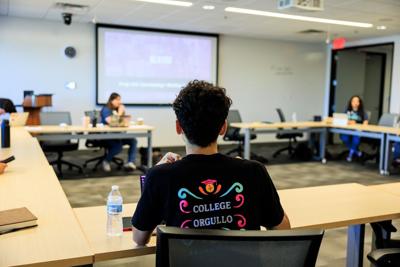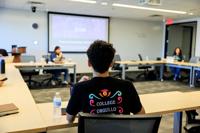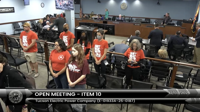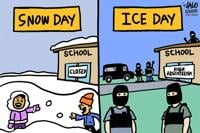
Undocumented students, also known as Dreamers, attend a college workshop offered by Aliento in Phoenix, Arizona.
Undocumented college students in Arizona are approaching the new semester with uncertainty following a summer break that placed immigration front and center in local and national politics.
Since returning to office, President Donald Trump’s administration has taken drastic steps to fulfill his campaign promise of cracking down on unauthorized immigration, many of which directly target undocumented youth.
Undocumented college students in Arizona made up 2.1% of enrollment at public universities in 2021, according to a study by the American Immigration Council.
In April, Trump issued an executive order that threatened in-state tuition to undocumented students, although Arizona students are protected under Prop. 308, approved by voters in 2022, which grants in-state tuition to qualifying undocumented students who attend a public university or college.
In June, the Trump administration ended Harvard University's Student and Exchange Visitor Program (SEVP) certification, blocking new international students from obtaining a visa, citing that the school was “fostering violence, antisemitism, and coordinating with the Chinese Communist Party.” And this week, NPR reported that the Department of Homeland Security (DHS) urged DACA recipients to self-deport as well.
“There is a systematic [attack] from the most powerful government in this world's history actively trying to attack [students],” said José Patiño, vice president at Aliento, an organization that helps undocumented students in Phoenix. “People are demonizing and it's a lot of those things that are impacting our community that this is fairly new to, not only Arizona, but nationwide.”
With the Fall 2025 semester fast approaching at Arizona’s public and private higher education institutions, many students are left wondering if continuing their education is worth the risk.
One student who has been affected is María, an undocumented student who attends Grand Canyon University (GCU), who spoke to CALÓ News under the condition of anonymity to protect her status and her family.
Living in fear
With classes back on the calendar, her eventual two-hour, round-trip commute to school has been top of mind.
“I don't have a driver's license. My parents usually are the ones that take me. Right now I'm just thinking, ‘Would it be beneficial instead, taking alternatives, like the public transportation or even Uber?’ Like, ‘what can I do to minimize the risk of anything happening on my way?’” she said.
She arrived in the United States as a two-year-old along with her parents. As the oldest child, she bore the responsibility of caring for her siblings and parents. But, with a family friend recently deported by immigration authorities, the family shifted that responsibility to her younger siblings.
“It really hit me when my siblings, who are United States citizens, had to get the talk: What might happen if your dad, me or your mom [are arrested]?” she said. “That's where it kind of hit me the most because I always wanted to protect them and now seeing them carry the burden, or the pressure of going to the store to buy necessities, has really been emotional.”
According to the Department of Homeland Security (DHS), more than 300,000 undocumented immigrants have been arrested in 2025. As of June 23, more than 4,000 people were detained in Arizona detention centers, according to data from the Transactional Records Access Clearinghouse (TRAC), a data-gathering organization associated with Syracuse University. Additionally, CALÓ News reported that the Trump Administration has allowed Immigration and Customs Enforcement (ICE) agents to operate in “sensitive areas,” such as houses of worship and schools.
María said her fears have led her to doubt if her schooling is worth it, experiencing moments where she feels isolated due to her legal status, which is a sentiment many other students share.
Diana, who asked not to be identified by her full name, is a second-year law student in Illinois and a recent GCU graduate. As an undocumented immigrant, she cannot practice law in Arizona, which led her to leave in 2024. Amidst fears of ICE raids and being separated from her family, her emotional well-being was affected.
“So, [in] my spring semester, my grades dropped,” she said. “There's a lot of times where [I asked myself], ‘What am I doing? Why am I going? Why am I spending money? Why am I paying rent, doing all this here, when I could just go back home, be with my family, and not continue this?’”
During these moments, she would reflect on the great work she was doing in Arizona to keep her going: community building.
“I was very involved in my undergrad; I helped create CanyonDreamers. It's a club for Dreamers at GCU, partnered with Aliento. I was only there to help create it and then I kind of stepped aside and left,” she said. “I did so much activism. I was interviewing, I was talking to churches, going places, doing things with legislators.”
Her activism now involves pursuing her career as an aspiring Family Law attorney in a migrant friendly state like Illinois. She credits Aliento for helping her find information regarding Arizona’s Bar Licensing rules, engaging in activism and building a community of support.
Activism as support
Patiño shared that Aliento has taken the Trump administration’s actions against undocumented immigrants personally. Patiño acknowledged that in the current political climate, it can be difficult for students to feel hope for the future, but they can make a positive change through support groups.
“We're going back to basics. We did a lot of trainings, workshops about not only teaching people, but really embodying the different levels of capital and power and access,” Patiño said. "It's a lot better when it's 100 people in a room feeling the same versus one person in a room feeling the same. And we know from our events there's a lot of people who are feeling alone, desolate, worried, sad, anxious and it's better when you're in a community.”
Aliento’s community building efforts have consisted of connecting students with immigration attorneys, scholarships and helping students with their self-advocacy skills through the Arizona’s Future Fellowship program and other leadership initiatives. According to Aliento’s 2024 impact report, the leadership program included over 1,200 students.
Maria participated in the program in 2023 and helped Aliento plan workshops that inform DACA and undocumented students of their rights, garnering a sense of hope.
“We would do events where we would either inform students about, like, the current laws and how they're impacting Dreamers,” she said. “Many of my friends who are Dreamers feel lonely. So hopefully with these events during the school year, it'll give that sense of community and motivation to keep hope.”
Seeing the events come to life and helping students like Maria motivates Patiño to encourage students to find and build their support groups.
“Find community and connection. It's really hard to be by yourself in these times; it's very lonely,” Patiño said. “[Keep in touch] with Aliento because we're going to have your back. Before they come after you, they're going to come after us.”
Resources for undocumented and DACA students
- Arizona State University offers the DREAM fund, a scholarship that eligible DACA students can apply for.
The University of Arizona (UA) offers tuition resources for undocumented students stating that “A student’s citizenship status does not impact their ability to apply to and be admitted to a college or university.”
For students who attend Grand Canyon University, clubs like GCU CanyonDreamers are available to join.
Students who are interested in getting involved with Aliento can follow this link.
Ghadiel Navarrete is a freelance reporter based in Phoenix, Arizona. He graduated in 2024 from ASU with a bachelor’s in Political Science and Journalism.











(0) comments
Welcome to the discussion.
Log In
Keep it Clean. Please avoid obscene, vulgar, lewd, racist or sexually-oriented language.
PLEASE TURN OFF YOUR CAPS LOCK.
Don't Threaten. Threats of harming another person will not be tolerated.
Be Truthful. Don't knowingly lie about anyone or anything.
Be Nice. No racism, sexism or any sort of -ism that is degrading to another person.
Be Proactive. Use the 'Report' link on each comment to let us know of abusive posts.
Share with Us. We'd love to hear eyewitness accounts, the history behind an article.